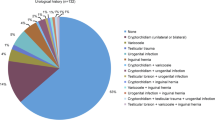Abstract
Objective
Evaluate sperm chromatin stability and its relationship with the rate of fertilization after procedures of intracytoplasmic sperm injection (ICSI) in a program of assisted reproduction.
Design
Prospective study.
Setting
Institute of Gynecology and Reproduction.
Patients
Thirty-three women with their respective partners (12 couples in the study group and 21 couples in the control group) participating in a program of assisted reproduction. The study group was defined as men with >30% of non-decondensed spermatozoa (high sperm chromatin stability).
Interventions
A part of each seminal sample was used to evaluate sperm chromatin stability under SDS and EDTA treatment and the second aliquot was used for the ICSI procedure. Fertilization was evaluated 16–18 h post sperm injection at a pronuclear stage. The fertilized oocytes were further cultured for 24–48 h before transfer to the patient.
Main outcome measures
Fertilization rate.
Results
Thirty-five oocytes (35.7%) in the group of study and 109 oocytes (78.9%) in the control group showed two pronuclei (P < 0.001). The coefficient of determination between the SDS + EDTA (Grade 2) and rate of fertilization was r 2 = 0.85 (P < 0.001) and the coefficient of regression was 1.72 ± 0.19 (β ± ES) (P < 0.001).
Conclusions
High sperm chromatin stability is a factor which reduces the rate of fertilization after ICSI procedure.
Similar content being viewed by others
References
Leung CK. Recent advances in clinical aspects of in vitro fertilization. Hong Kong Med J 2000;6:169–76.
Campbell AJ, Irvine DS. Male infertility and intracytoplasmic sperm injection (ICSI). Br Med Bull 2000;56:616–29.
Yanagida K, Morozumi K, Katayose H, Hayashi S, Sato A. Successful pregnancy after ICSI with strontium oocyte activation in low rates of fertilization. Reprod Biomed Online 2006;13:801–6.
Francavilla S, Cordeschi G, Pelliccione F, Bocchio M, Francavilla F. Isolated teratozoospermia: a cause of male sterility in the era of ICSI. Front Biosci 2007;12:69–88.
Acharyya S, Kanjilal S, Bhattacharyya AK. Does human sperm nuclear DNA integrity affect embryo quality. Indian J Expe Biol 2005;43:1016–22.
Boe-Hansen GB, Fedder J, Ersboll AK, Christensen P. The sperm chromatin structure assay as a diagnostic tool in the human fertility clinic. Hum Reprod 2006;21:1576–82.
Moaz MN, Khattab S, Foutouh IA, Mohsen EA. Chemical activation of oocytes in different types of sperm abnormalities in cases of low or failed fertilization after ICSI: a prospective pilot study. Reprod Biol Online 2006;13:791–4.
Lee JW, Tian XC, Yang X. Failure of male pronucleus formation is the major cause of lack of fertilization and embryo development in pig oocytes subjected to intracytoplasmic sperm injection. Biol Reprod 2003;68:1341–7.
Nasr-Esfahani MH, Razavi S, Mozdarani H, Mardani M, Azvagi H. Relationship between protamine deficiency with fertilization rate and incidence of sperm premature chromosomal condensation post-ICSI. Andrologia 2004;36:95–100.
Flaherty SP, Payne D, Matthews CD. Fertilization failures and abnormal fertilization after intracytoplasmic sperm injection. Hum Reprod 1998;13(Suppl 1):155–64.
Flaherty SP, Payne D, Swann NJ, Mattews CD. Aetiology of failed and abnormal fertilization after intracytoplasmic sperm injection. Hum Reprod 1995;10:2623–9.
Gonzales GF, Sanchez A. High sperm chromatin stability in semen with high viscosity. Arch Androl 1994;32:31–5.
Gonzales GF, Villena A. Influence of low corrected seminal fructose levels on sperm chromatin stability in semen from men attending an infertility service. Fertil Steril 1997;67:763–8.
Gonzales GF, Salirrosas A, Torres D, Sanchez A, Villena A. Use of clomiphene citrate in the treatment of men with high sperm chromatin stability. Fertil Steril 1998;69:1109–15.
Gonzales GF. Function of seminal vesicles and their role on male fertility. Asian J Androl 2001;3:251–8.
Gonzales GF. Functional structure and ultra structure of seminal vesicles. Arch Androl 1989;22:1–14.
WHO. WHO Laboratory manual for the examination of human semen and sperm-cervical mucus interaction. 4th edition. Madrid: Medica Panamericana. 2001.
Kruger T, Acosta A, Simmons K. Predictive value of abnormal sperm morphology in in vitro fertilization. Fertil Steril 1988;49:112–7.
Kvist U, Kjelberg S, Bjorndahl L, Hammar M, Roomans G. Zinc in sperm chromatin and chromatin stability in fertile men and men in barren unions. Scand J Urol Nephrol 1988;22:1–6.
Tavmergen E, Goker E, Sendag F, Sendag H, Levi R. Comparison of short and long ovulation induction protocols used in ART applications according to the ovarian response and outcome of pregnancy. Arch Gynecol Obstet 2002;266:5–11.
Hammadeh M, Al-Hasani S, Doerr S, Stieber M, Rosenbaum P, Schmidt W, et al. Comparison between chromatin condensation and morphology from testis biopsy extracted and ejaculated spermatozoa and their relationship to ICSI outcome. Human Reprod 1999;14:363–367.
Benadiva CA, Nulsen J, Siano L, Jennings J, Givargis HB, Maier D. Intracytoplasmic sperm injection overcomes previous fertilization failure with conventional in vitro fertilization. Fertil Steril 1999;72:1041–4.
Tesarik J, Mendoza C. Treatment of severe male infertility by micromanipulation-assisted fertilization: an update. Front Biosci 2007;12:105–14.
Bjorndahl L, Kjellberg S, Kvist U. Ejaculatory sequences in men with low sperm chromatin-zinc. Int J Androl 1991;14:174–8.
Hammadeh ME, Al-Hasani S, Gauss C, Rosenbaum P, Georg T, Diedrich K, et al. Predictive value of chromatin decondensation in vitro on fertilization rate after intracytoplasmic sperm injection (ICSI). Int J Androl 2001;24:311–6.
Sakkas D, Urner F, Bianchi P, Bizarro D, Wagner I. Sperm chromatin anomalies can influence descondensation after intracytoplasmic sperm injection. Human Reprod 1996;11:837–43.
Gopalkrishnan I, Hinduja N, Anand T. In vitro descondensation of nuclear chromatin of human spermatozoa: assessing potential. Arch Andrology 1991;27:43–50.
Borini A, Bafaro M, Bianchi L. Oocyte donation programme: results obtained with intracytoplasmic sperm injection in cases of severe male factor infertility or previous failed fertilization. Human Reprod 1996;11:548–50.
Becker B, Bertrand E, Van Hoeck J, Verhaegen G, Rozenberg S, Delvigne A. Outcome of conventional IVF and ICSI on sibling oocytes in patients suffering from teratospermia. Int J Fertil Womens Med 2006;51:163–9.
Acknowledgements
Authors thanks to Cynthia Gonzales-Castañeda for her help in the English edition.
Author information
Authors and Affiliations
Corresponding author
Rights and permissions
About this article
Cite this article
García, J., Noriega-Hoces, L. & Gonzales, G.F. Sperm chromatin stability and its relationship with fertilization rate after Intracytoplasmic Sperm Injection (ICSI) in an assisted reproduction program. J Assist Reprod Genet 24, 587–593 (2007). https://doi.org/10.1007/s10815-007-9174-1
Received:
Accepted:
Published:
Issue Date:
DOI: https://doi.org/10.1007/s10815-007-9174-1




